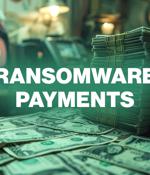Security News

CEO of Cloud Software a 'special government employee' probing through IT for Elon Musk's DOGE The US Treasury has revealed Tom Krause – the chief exec of Citrix and Netscaler owner Cloud Software...

Nothing to see here, just a 'special government employee' doing his job The US Treasury Department has assured Congress that a "special government employee" associated with Elon Musk's Department...

The proposed mandate intends to discourage criminals from targeting critical national infrastructure and public services, as there will be no financial motivation.

European Space Agency's official web shop was hacked as it started to load a piece of JavaScript code that generates a fake Stripe payment page at checkout. [...]

Despite the efforts of law enforcement agencies to stop and bring to justice those responsible for ransomware attacks, the situation is not improving. While authorities do not recommend making a...

Change Healthcare’s $2 billion recovery is still a work in progress Still reeling from its February ransomware attack, Change Healthcare confirms its clearinghouse services are back up and...

Cybercriminals have devised a novel method to cash out from stolen credit card details linked to mobile payment systems such as Apple Pay and Google Pay, dubbed 'Ghost Tap,' which relays NFC card...

Threat actors are increasingly banking on a new technique that leverages near-field communication (NFC) to cash out victim's funds at scale. The technique, codenamed Ghost Tap by ThreatFabric,...

Fastidious attacker then tidied up email trail behind them A Maryland AI company has confirmed to the Securities and Exchange Commission (SEC) that it lost $250,000 to a misdirected wire payment.…

As the winter season kicks in, scammers are not missing the chance to target senior British residents with bogus "winter heating allowance" and "cost of living support" scam texts. [...]